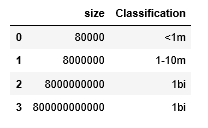I'm trying to infer a classification according to the size of a person in a dataframe like this one:
Size
1 80000
2 8000000
3 8000000000
...
I want it to look like this:
Size Classification
1 80000 <1m
2 8000000 1-10m
3 8000000000 >1bi
...
I understand that the ideal process would be to apply a lambda function like this:
df['Classification']=df['Size'].apply(lambda x: "<1m" if x<1000000 else "1-10m" if 1000000<x<10000000 else ...)
I checked a few posts regarding multiple ifs in a lambda function, here is an example link, but that synthax is not working for me for some reason in a multiple ifs statement, but it was working in a single if condition.
So I tried this "very elegant" solution:
df['Classification']=df['Size'].apply(lambda x: "<1m" if x<1000000 else pass)
df['Classification']=df['Size'].apply(lambda x: "1-10m" if 1000000 < x < 10000000 else pass)
df['Classification']=df['Size'].apply(lambda x: "10-50m" if 10000000 < x < 50000000 else pass)
df['Classification']=df['Size'].apply(lambda x: "50-100m" if 50000000 < x < 100000000 else pass)
df['Classification']=df['Size'].apply(lambda x: "100-500m" if 100000000 < x < 500000000 else pass)
df['Classification']=df['Size'].apply(lambda x: "500m-1bi" if 500000000 < x < 1000000000 else pass)
df['Classification']=df['Size'].apply(lambda x: ">1bi" if 1000000000 < x else pass)
Works out that "pass" seems not to apply to lambda functions as well:
df['Classification']=df['Size'].apply(lambda x: "<1m" if x<1000000 else pass)
SyntaxError: invalid syntax
Any suggestions on the correct synthax for a multiple if statement inside a lambda function in an apply method in Pandas? Either multi-line or single line solutions work for me.

